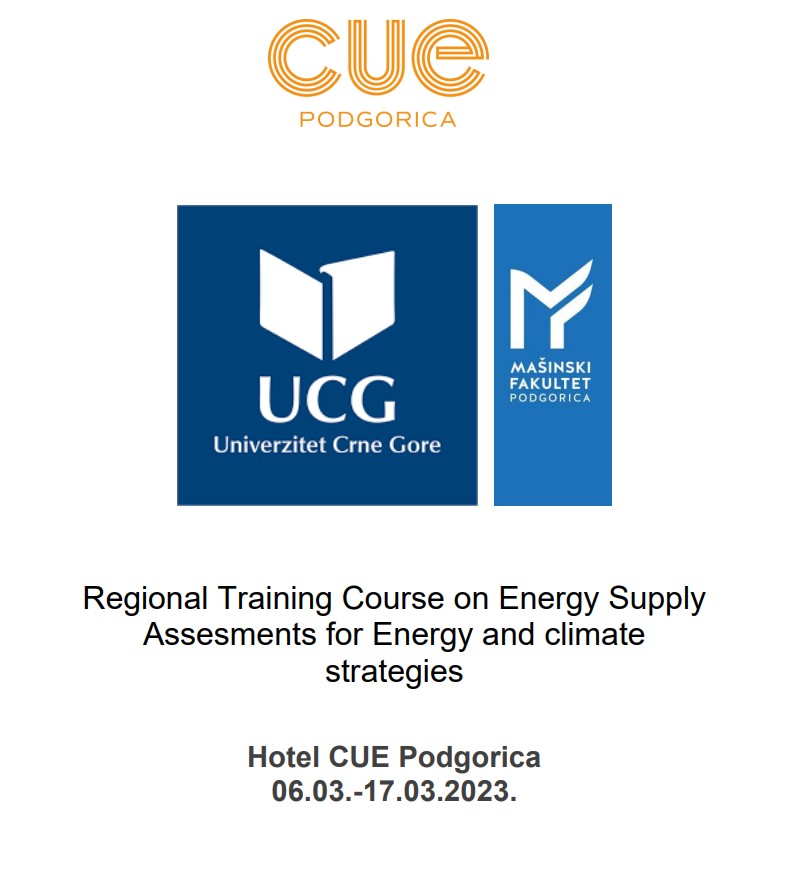Regionalni trening: Sa EU ekspertima o obnovljivim vidovima energije i novim tehnologijama
Univerzitet Crne Gore i Centar za energetiku Mašinskog fakulteta UCG, zajedno sa Međunarodnom agencijom za atomsku energiju, organizovali su Regionalni trening o procjeni snabdijevanja energijom iz obnovljih vidova energije a koje su vezane za energetske i klimatske strategije, u Hotelu CUE, u Podgorici.
Trening koji je počeo 6. marta, a održava se do 17. marta, dio je projekta „Analiza niskokarbonskih puteva u cilju dekarbonizacije energetskog sektora u EU do 2050“. Nacionalni koordinator ovog projekta je prof. dr Igor Vušanović, redovni profesor Mašinskog fakulteta i rukovodilac multidiciplinarnog master studijskog programa Energetska efikasnost na Mašinskom fakultetu.
„Regionalni trening je okupio 22 eksperta iz više od 15 zemalja EU i šire, a naša očekivanja su da će poboljšati kapacitet za procjenu ambicioznog smanjenja emisija u vezi sa opskrbom energijom sa IAEA modelom MESSAGE, uključujući i dio nacionalnih energetskih i klimatskih planova i strategija. U skladu s tim, očekuje se da će ubuduće biti produbljeno razumijevanje uloge pojedinih tehnologija i njihovog doprinosa scenarijima za smanjenja emisija gasova staklene bašte. Trening je prilika da se ohrabre novi pristupi koji se primjenjuju kao dio tekućih ili budućih nacionalnih studija u energetici. Ovaj događaj će, sigurni smo, doprinijeti ukupnom ishodu projekta, tj. jačanju institucionalnih kapaciteta za razvoj nacionalnih energetskih i klimatskih planova i strategija za podršku definisanju obaveza prema Pariskom sporazumu“, kazao je profesor Vušanović.
Pored njega, aktivni učesnici obuke za energetski paket projekta MESSAGE su i doc. dr Esad Tombarević, rukovodilac Centra za energetiku Mašinskog fakulteta, i mr Boris Hrnčić, doktorand na Mašinskom fakultetu iz oblasti energetskog planiranja i primjene optimizacionih metoda u energetskom planiranju.
„Svrha treninga je obuka učesnika za primjenu IAEA alata pod nazivom MESSAGE za tehno-ekonomske procjene snabdijevanja energijom primjenom naprednih načina dekarbonizacije koje treba da vode ka karbonskoj neutralnosti Crne Gore do 2050. godine“, objasnio je profesor Vušanović.
Polaznici će steći vještine za procjenu povezanih puteva i trendova, kao što je sve veća elektrifikacija energetskog sistema i povećanje udela (varijabilne) proizvodnje sa niskim sadržajem ugljenika uz održavanje pouzdanog rada elektroenergetskog sistema i obezbeđivanje sigurnosti snabdevanja. U tu svrhu će se u budućnosti u Crnoj Gori primijenjivati IAEA model energetskih sistema pod nazivom MESSAGE.
Projekat u okviru kojeg se realizuje trening osmišljen je da podrži razvoj energetskih strategija za ublažavanje klimatskih promjena u skladu sa Pariskim sporazumom, uključujući planove zemalja za implementaciju nacionalno određenih doprinosa (NDC) i nacionalnih energetskih i klimatskih planova (NECP). Pored toga projekat ima za cilj da pruži podršku državama članicama u njihovoj pripremi za podnošenje povezanih ažuriranja, koja za NDC treba da budu do 2025. godine, a za NECP do 2023. i 2024. godine za nacrt i konačna ažuriranja.
„Mnoge zemlje koje učestvuju u ovom projektu obavezale su se da će do sredine vijeka dostići neto nultu emisiju. Da bi se takve ambicije mogle prevesti na energetske puteve koji su pristupačni, efikasni i održivi, potreban je holistički pristup energetskim procjenama. Potrebno je da obuhvati sve energetske sektore, uključujući električnu energiju, grijanje i hlađenje i transport, uz balansiranje između ponude i potrošnje energije i mjera za uštedu emisija. Nadalje, mora biti tehnološki neutralan kako bi se osigurala nepristrasna procjena svih opcija ublažavanja koje zemlja može razmotriti, uključujući obnovljivu energiju ili nuklearnu energiju. Navedeni regionalni kurs se fokusira na analizu uloge energetskih tehnologija na strani ponude kao dijela nacionalnih scenarija prema ambicioznim energetskim sistemima s niskim udjelom ugljenika“, kazao je Vušanović.





.jpg&h=1000)
.jpg&h=1000)